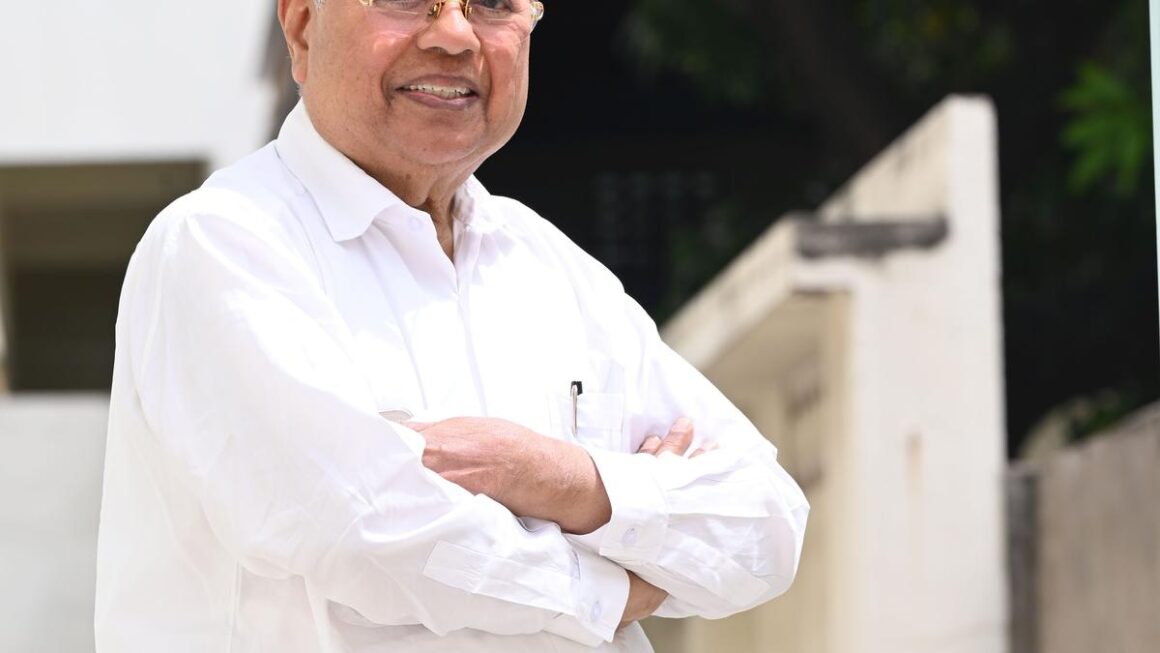
Nalli Kuppuswami Chetti.
| Photo Credit: Johan Sathyadas
Nalli Kuppuswami Chetti has been a patron of the arts for long. Over the decades of seeing the December Season flourish in Madras and then Chennai, he’s presided over tremendous change. In 1954, he was a 14-year-old boy who stood mesmerised outside his family textile shop in T. Nagar as music wafted through the air from the nearby Krishna Gana Sabha. In 2024, the 85-year-old rasika of music still marks out his favourite concerts without fail.
In numerous interviews, Kuppuswami Chetti has spoken about how he learnt to understand the music that he already enjoyed. He is someone who has taken a long-term view of the sabha culture and the Season, and ensures the arts are supported. He backs almost every other sabha in Chennai.
How does he view the sabha experience and the big day when the Season’s calendar is out? “Usually, in the supplement that comes out on December 1, almost all the sabhas advertise their programmes. I’ve seen sabha regulars take out their pen and paper and mark their favourites. Some would even be so particular as to see who are the accompanying artistes they are playing with. They would map out the sabhas they have to visit every day. This was the scene till 2019, when we had 141 sabhas,” says the textile magnate and philanthropist.
Today, the number of sabhas in a post-Covid world has dwindled to just 60. “I miss the old bonhomie and the festive spirit in the sabhas. It was a place where we would catch up with friends and even relatives, and partake of good canteen food. That kondattam (celebration) is missing. I saw very few NRIs last year. They would really enjoy the curation and everything associated with the Season,” he recalls.
Among the changes are the fewer number of people buying season tickets. “They constitute hardly five per cent now. People prefer to go from sabha to sabha depending on the concert they want to listen to, and don’t mind buying daily tickets.”
Over the years, Kuppuswami Chetti has also seen the slots given to instrumental music reduce, and even the range of instruments come down. “Earlier, all instruments would be given a slot — veena, flute, mandolin, violin, saxophone and nagaswaram. Now, many sabhas stop with one or two instruments,” he rues.
Despite what seems like a lag in audience participation, Kuppuswami Chetti says that every artiste dreams of a sabha performance at least once. “Every year, so many children put in the hard work and it is only fair they get a stage opportunity. I remember how two sisters once flew in from the U.S., performed in their designated slot and left that very night. This was an opportunity they could not miss. For them, coming to Chennai during the Season is like a pilgrimage.”
Kuppuswami Chetti says the first step to revive the Season is to create a new generation of rasikas who are knowledgeable about ragas. “Right now, you find only the elderly. We need more young people to absorb the vibe.” Till then, he is waiting for that happy confusion to set in — a surfeit of good concerts in a day spread across sabhas in town and being unable to decide where to go.
Kuppuswami Chetti also recalls the time when he saw the current top performers as children during the early morning or early evening slots, and told himself that they would make it big. “I feel very validated when I see them now. When youngsters play an instrument or sing, I think of how other children in the auditorium might get inspired. Even if you know light music, knowing the basics of classical music will help you appreciate Carnatic music better,” he says.
Then, there’s the tip Kuppuswami Chetti followed in the initial days, based on the suggestion of a friend — allow a related movie song to play in your mind and then discover the raga. Those days, a book that detailed film songs and linked them to their respective classical ragas was hugely popular.
But what Kuppuswami Chetti looks forward to most is listening to up-and-coming talent. “I remember there was this young boy who was nine years old then. It was a concert in Salem and someone asked him to play Abhogi raga. In a sweet voice, he said he did not know it, but asked his accompanist, mridangist Sikkil Bhaskaran, to play the arohanam and avarohanam and said he would try to play it. That was, Mandolin U. Srinivas, who went on to explore the raga for a solid 45 minutes.”
The Margazhi season gives a lot of joy to rasikas, but it also does something equally important, says Kuppuswami Chetti — it helps identify new talent, year on year, platforms them and ensures they are supported in their musical journey, from the morning slot to the afternoon and then the main evening slots.
Published – December 31, 2024 01:04 pm IST


Leave a Reply